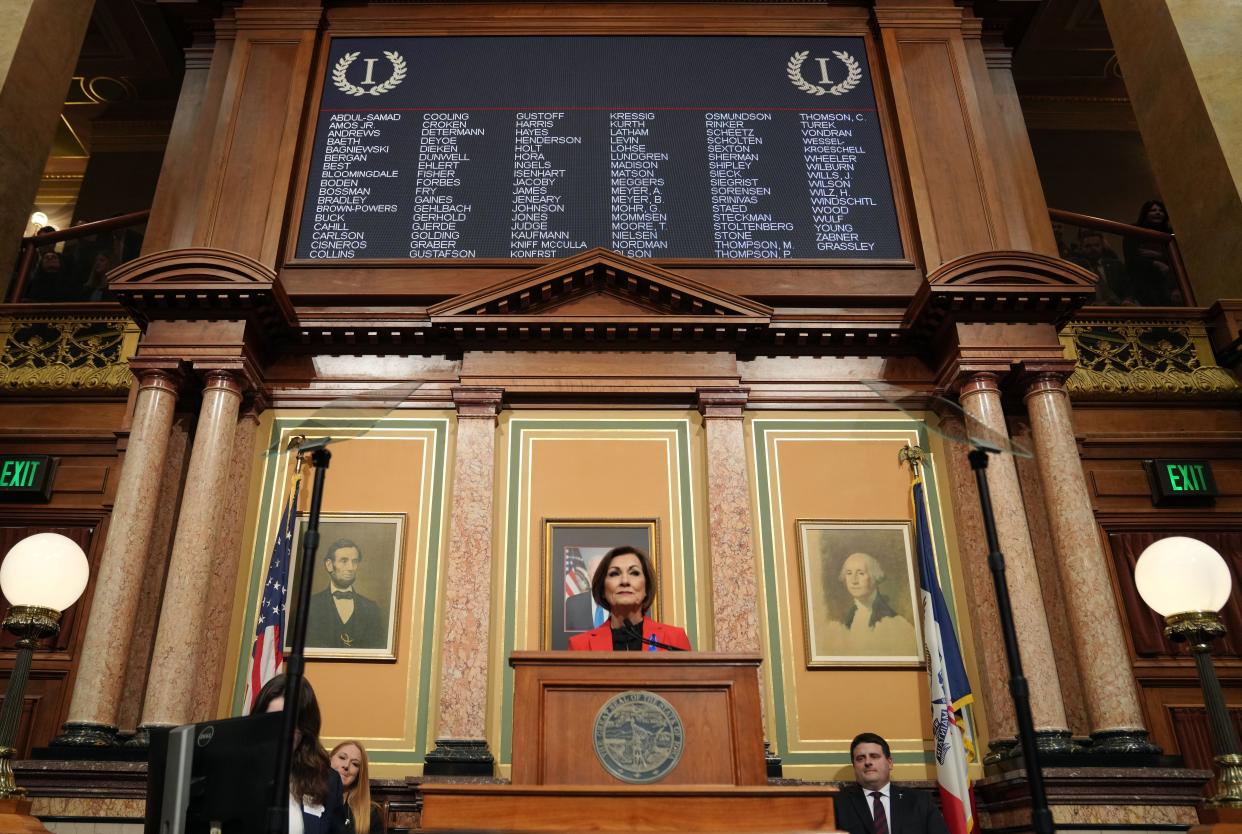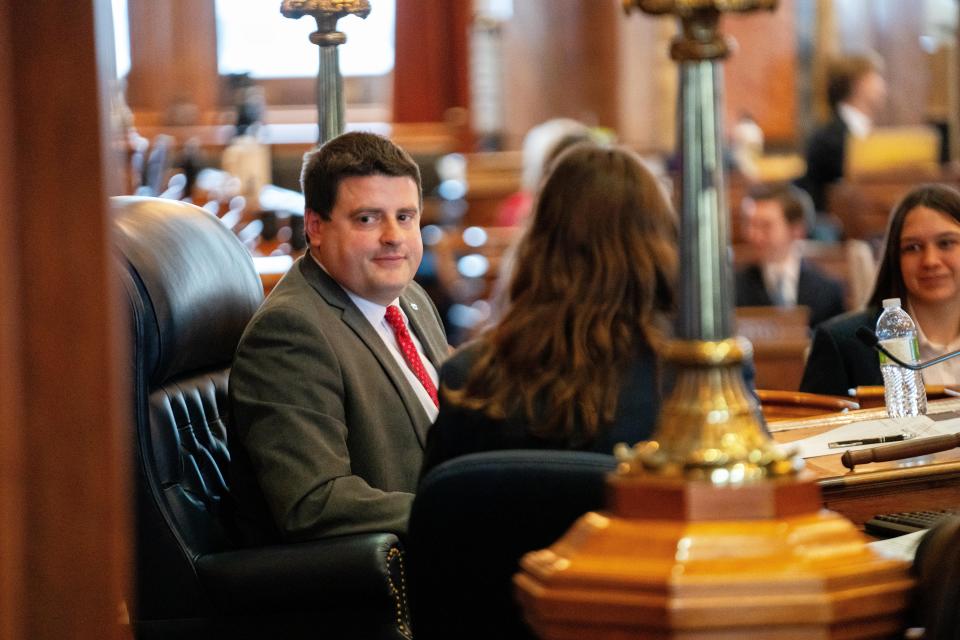Win some, lose some: How Gov. Kim Reynolds' ambitious legislative agenda fared in 2024

As she addressed the Iowa Legislature on Jan. 9, Gov. Kim Reynolds made clear her intentions for the next four months.
“There are those who said we did too much, too fast,” Reynolds said in her annual Condition of the State speech, recognizing the sweeping changes to education, taxes and other policies she’s signed into law.
“But when I look at the result of our hard work, I know we’ve made a difference. And it drives me to do it again, to work even harder this session.”
The agenda she unveiled matched those ambitions.
She urged the Republican-led General Assembly to make another bundle of changes to education, including overhauling how special education services are provided and raising how much teachers are paid.
She outlined a plan to further cut income taxes. And she pushed to continue restructuring the state government through mental health providers and state boards and commissions — among more than a dozen other policy proposals.
By the time the final gavel fell in the early hours of April 20, ending the 2024 session, legislation reflecting many of Reynolds’ priorities had landed on her desk for her signature — but not without navigating disagreements among Republicans, including some of the most vocal opposition she’s faced under her administration.
“We’ve done a lot of difficult things as a caucus, and working with the Senate and with the governor,” House Speaker Pat Grassley, R-New Hartford, told reporters shortly after the chamber adjourned. “And a lot of the things that have been left are some of the hardest things.”

Democrats were quick to point out conflict within the GOP, particularly when extended negotiations on an education package meant a delay on setting school funding levels.
But House Minority Leader Jennifer Konfrst, D-Windsor Heights, maintained that at the end of the day, she believed lawmakers on the other side of the aisle were intent on fulfilling Reynolds’ wishes.
“The governor runs this building with Republicans,” Konfrst said on the evening before the end of the session. “Her agenda, her politics, are always center stage. I continue to remind my colleagues that we are a separate branch of government, and that we don’t work for the governor. But the Republican leadership and Republican legislators sure act like they do.”
An analysis of the Legislature and Reynolds' agenda shows some of her biggest wins and losses this session:
More: What's in Iowa's $8.9 billion state budget for the coming year? We break it down.
Win: Area Education Agency restructure hits hurdles, but clears the finish line
Reynolds’ top policy priority this session also proved to be among the most controversial — a top-to-bottom overhaul of Iowa’s Area Education Agencies, which for decades served as the sole provider of special education, media and other education services for school districts.
“I need local governments to take a look at the level of bureaucracy that we have in place to serve the citizens of Iowa,” Reynolds said in January on “Iowa Press” on Iowa PBS. “It’s too much. … We need to get that funding in the classroom and do everything we can to improve the outcomes for these children.”

The governor’s initial plan, to drastically narrow the scope of AEAs’ services and allow districts to seek private providers, encountered significant resistance, including among Republican lawmakers. She repeatedly insisted she had no intention of closing any of the AEAs, while arguing “we don’t need nine” of them.
Days after releasing her proposal, Reynolds’ office dropped an amendment to the bill that did little to assuage many concerns. Education groups, advocates and parents packed committee rooms and flooded lawmakers with a steady stream of emails and phone calls.
In the House, the plan failed to advance through subcommittee, and a Republican senator threw a copy of the original bill in the trash can mid-hearing.

What emerged, after weeks of closed-door negotiations and separate plans advancing through the House and Senate, was a compromise among Republicans — continuing to send the AEAs 90% of special education funding, while giving school districts control of all money for media and general education services — about $68 million.
One of the House’s lead negotiators, Rep. Skyler Wheeler, R-Hull, was frank in his assessment of how the original plan was presented.
“The rollout sucked,” Wheeler said during floor debate. “I wish we could go back.”
The final bill, signed into law by Reynolds, is likely to reshape Iowa’s education landscape for years to come: The AEAs have already reported significant staff turnover, while districts mull how to use a broad pool of money they previously didn’t have access to.
More: Our look at the biggest bills that passed and failed in the Iowa Legislature's 2024 session
Win: Iowa teachers get a pay bump
Also included in the sweeping education package that restructured AEAs was legislation increasing the minimum pay for Iowa teachers.
Its passage was a win for Reynolds, who called for pay raises in her annual address, and a win for lawmakers on both sides of the aisle who saw the hikes as necessary to keep Iowa competitive with neighboring states.
“Iowa currently ranks in the bottom half of states for starting teacher pay, and with this increase we soar to the top five in the nation," Reynolds said after the bill passed.
“But even better than our ranking is the message it sends to current and prospective teachers: Iowa values education and those who dedicate their careers to students, and their pay should absolutely reflect it.”
First-year teacher salaries will start at $47,500 in the coming school year and $50,000 the following year, up from $33,500.
And teachers with more than 12 years of experience will receive a minimum of $60,000 in the coming year, and $62,000 the following year.
House Republicans also successfully pushed to include $14 million to raise pay for nonsalaried school staff, such as paraeducators.
More: All-night marathon caps Iowa Legislature's 2024 session. What's changing: AEAs, your taxes
Win: Accelerated income tax cuts
An eleventh-hour deal on taxes will see Iowa’s flat income tax take full effect next year, rather than 2026. And the legislation drops the rate to 3.8%, rather than the 3.9% in current law.
It’s the latest major tax cut that Reynolds will be able to sign into law as governor after signing previous reductions in 2018, 2021, 2022 and 2023.
Reynolds had proposed deeper income tax cuts this year and called for reducing the unemployment taxes paid by businesses. Lawmakers never passed the changes to unemployment taxes, and didn’t take up Reynolds’ call to tax commercial child care centers at a lower rate.
But she was still able to claim a win.
“Iowa families live within their means every day, and there’s no reason government can’t do the same,” Reynolds said in a statement.
Wins: Consolidating behavioral health system, boards and commissions
This session saw Reynolds continue to press forward on her years-long effort to reshape and reduce state government.
Her proposal to merge local mental health and substance abuse regions, in an effort to make services more accessible, saw wide support among lawmakers and was sent to her desk.
So too was a consolidation of dozens of state boards and commissions, and she swiftly signed into law a bill to remove the requirement that those boards have a balance of men and women serving on them.
That trio of bills followed her spearheading of an effort last session to reorganize much of Iowa’s bureaucracy and state agencies.
“Government works for the people, not the other way around,” Reynolds said after the bill consolidating boards and commissions passed.
The efforts were met with some criticism.
Advocates and health care organizations, while agreeing that mental health and disability services were “fractured,” worried that merging them into new districts could disrupt critical services. And Democrats argued that consolidating boards, while also removing their gender balance, would limit opportunities for public input.
Win: Extending postpartum Medicaid coverage
Reynolds succeeded with a proposal to extend Medicaid coverage to low-income mothers for a full year after giving birth.
Her proposal paired the extension for low-income families with a reduction in who can qualify.
Currently, new mothers with a maximum family income of 375% of the federal poverty level — about $117,000 for a family of four — are eligible for coverage in Iowa.
More: Iowa lawmakers approve Medicaid extension for new mothers, ending coverage for hundreds
Reynolds' plan lowers the income ceiling for postpartum coverage to 215% of the federal poverty level, about $64,500 annually for a family of four.
The new legislation will end Medicaid coverage for an estimated 1,700 women and babies per month.
Reynolds proposed the reduction so the state’s cost for providing postpartum Medicaid coverage would remain about the same.
It drew criticism from some Democrats, who said it soured them on a bill they otherwise widely supported.
Loss: Defining ‘man’ and ‘woman’ in state law
Not all of Reynolds’ policy goals were accomplished this session.
Among those that fell short was her bill that would have defined “man” and “woman” in state law, as well as required new birth certificates for transgender Iowans that reflect their sex assigned at birth and current identity.
Upon its introduction, the bill also would have required changes to driver’s licenses, altered how public health data is collected and offered anti-discrimination protections.

Reynolds said the bill “protects women’s spaces and rights afforded to us by Iowa law and the constitution.” LGBTQ+ and civil rights groups, meanwhile, blasted it as “erasure” and an “astonishing violation” of privacy.
It advanced through committee in the House, drawing protesters and activists to the Capitol rotunda, but never saw floor debate and died in the second “funnel” deadline.
A number of bills debated this session spurred less public debate and controversy, but still resulted in wins for Reynolds' agenda — but also several losses.
Win: Regulations on foreign farmland ownership
Lawmakers unanimously passed an update of Iowa’s law governing foreign ownership of farmland, which includes stronger disclosure requirements for foreign owners, increased penalties for those that fail to meet them and new subpoena powers for Iowa’s attorney general.
Win: Student literacy guidelines
Reynolds claimed a victory with passage of a law focused on improving student literacy, although the final measure was less extensive than her initial proposal.
The law requires students in Iowa's teacher-preparation programs to take the "Foundations of Reading" assessment developed by Massachusetts. Aspiring teachers do not have to pass the test to graduate and receive their teaching licenses, but the results will be reported to the Iowa Department of Education.
Schools are required to provide personalized lesson plans to students in kindergarten through sixth grade who are not reading at grade level. If a parent asks for their child to repeat a grade, the school must honor the request.
Reynolds said investing in literacy means “opening opportunities for our kids in the future,” while granting parents “more control over their child’s success.”
Win: ‘Thrive Iowa’ resource program
Reynolds scored another win on the final day of the legislative session when lawmakers approved up to $8 million to be used for “Thrive Iowa,” a new program that will use state navigators in the Department of Health and Human Services to refer Iowans to services from private providers, including churches and nonprofits.
It’s modeled after Hope Florida, a similar program that Florida Gov. Ron DeSantis put in place.
Loss: Expanding birth control access
Republican lawmakers also opted once again not to expand access to over-the-counter birth control as proposed by Reynolds. A bill allowing pharmacies to sell certain forms of birth control, like pills, birth control patches and vaginal rings, without first seeing a doctor, failed to make it to the floor.

Loss: Providing paid leave for state workers
The governor’s proposal to provide paid parental leave for state employees — up to four weeks for those who give birth or adopt and one week for those who don’t — never made it through either chamber.
Loss: Distributing opioid settlement money
Lawmakers ended the legislative session without agreement on how to spend more than $12 million of the dollars in Iowa’s Opioid Settlement Fund. Reynolds had called for investing the money in a grant program for recovery providers, scholarships and workforce training, peer to peer support and a youth substance use treatment center.
Loss: Age verification for pornographic sites
Reynolds’ proposal to require pornographic websites to verify the ages of their users never received a vote in the House or Senate.
Galen Bacharier covers the Statehouse & politics for the Register. Reach him at [email protected]m or (573) 219-7440, and follow him on Twitter @galenbacharier.
Stephen Gruber-Miller covers the Iowa Statehouse and politics for the Register. He can be reached by email at [email protected] or by phone at 515-284-8169. Follow him on Twitter at @sgrubermiller.
This article originally appeared on Des Moines Register: Iowa Gov. Kim Reynolds notches major wins with 2024 legislative agenda
Solve the daily Crossword

